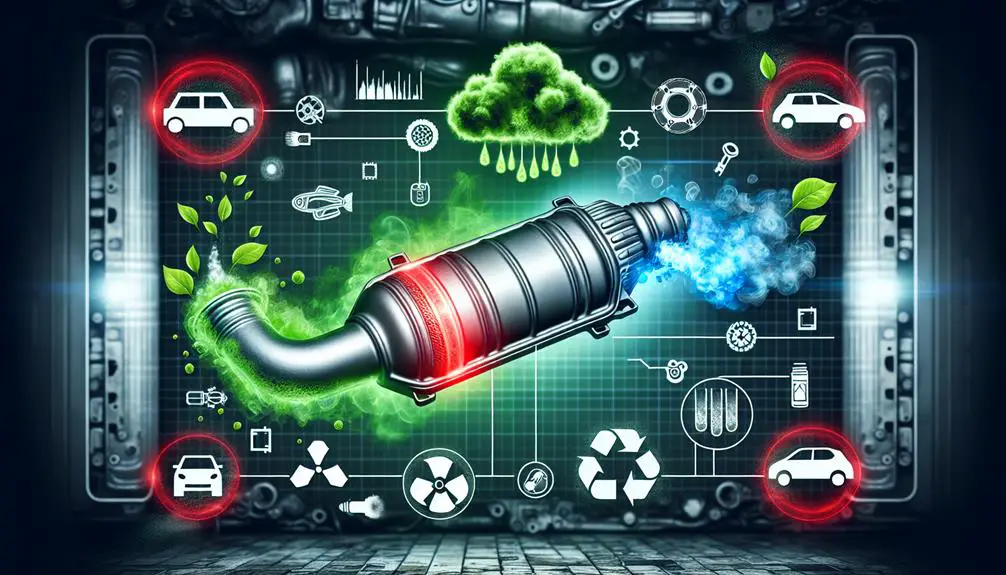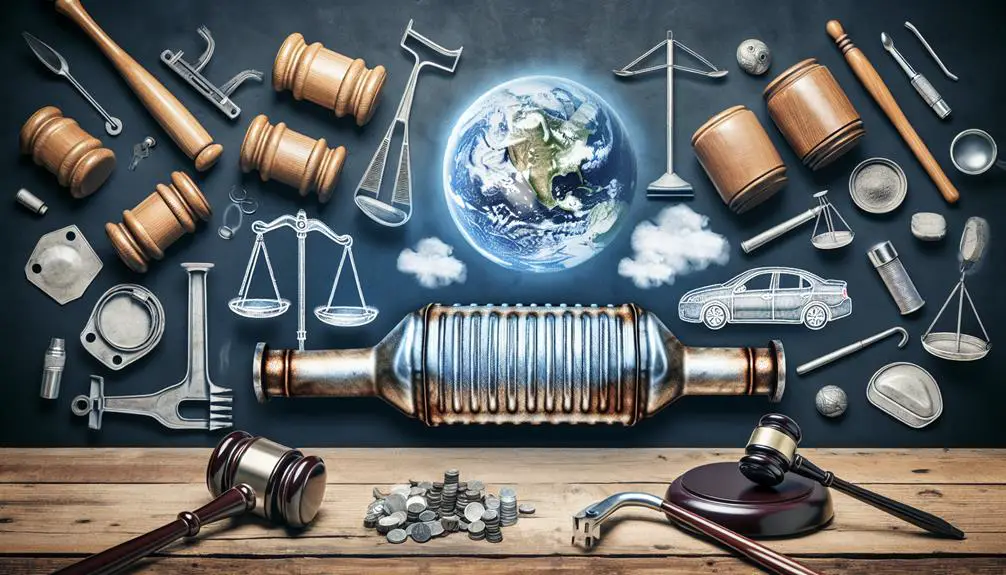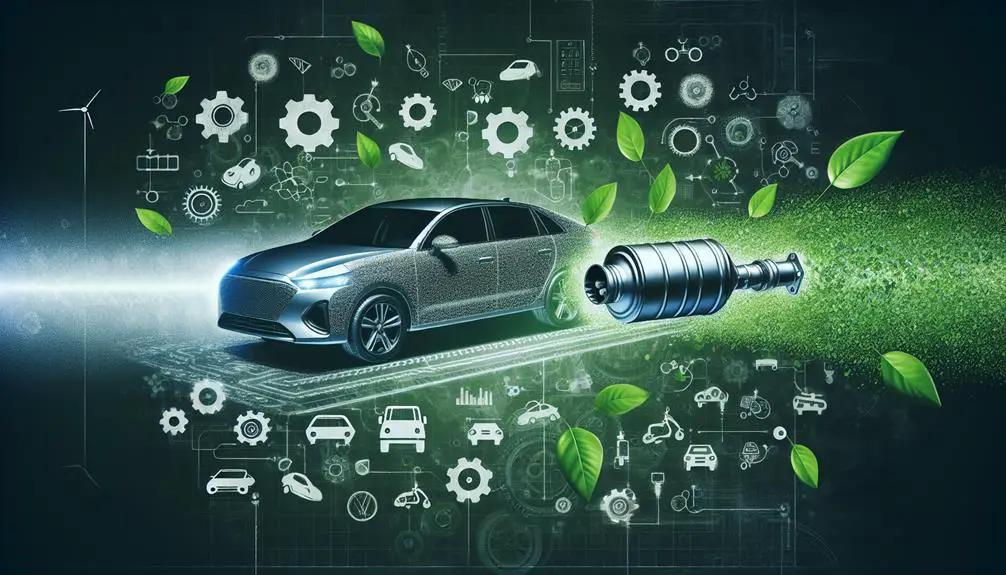Cars need a catalytic converter
to reduce harmful emissions, protect the environment, and meet legal emission standards.
Essential Functions of Catalytic Converters

Catalytic converters play a crucial role in reducing your car's emissions by converting harmful pollutants into less harmful gases. They're your car's silent guardians, ensuring you're not contributing more than necessary to air pollution. Situated between the engine and the muffler in your vehicle's exhaust system, they tackle the problem right at the source.
Here's how they work: when exhaust gases enter the converter, they pass over a converter, typically made of platinum, palladium, and rhodium. This converter triggers a chemical reaction without being consumed or altered itself. It's like magic, but for chemistry. The process transforms carbon monoxide, a dangerous and odorless gas, into carbon dioxide. It also converts other harmful substances like nitrogen oxides back into nitrogen and oxygen, which are harmless.
You might wonder why this matters to you. Well, besides the obvious environmental benefits, keeping your catalytic converter in good shape can save you from headaches down the road. A failing converter can lead to decreased performance, a check engine light, and even a failed emissions test. So, it's not just about doing good for the environment; it's also about keeping your ride smooth and stress-free.
Reducing Harmful Emissions
Minimizing your car's harmful emissions directly contributes to cleaner air and a healthier environment for everyone. When you drive, your car burns fuel, which releases different pollutants into the air. These include carbon monoxide, nitrogen oxides, and hydrocarbons, all of which are harmful to both the environment and human health. Catalytic converters play an essential role in reducing these emissions, making your vehicle more eco-friendly.
Here's how catalytic converters help:
- Convert Important Gases: They transform carbon monoxide, a poisonous gas, into carbon dioxide. While CO2 is a greenhouse gas, it's less directly harmful to human health than CO.
- Reduce Nitrogen Oxides: These devices break down nitrogen oxides (NOx), which contribute to smog and acid rain, into nitrogen and oxygen, which naturally exist in the atmosphere.
- Oxidize Hydrocarbons: Ultimately, catalytic converters oxidize unburned hydrocarbons in the exhaust, turning them into carbon dioxide and water, reducing the risk of smog and ground-level ozone formation.
Legal and Regulatory Requirements

Exploring the role of catalytic converters in reducing emissions leads us to examine the legal and regulatory requirements governing their use in vehicles. You mightn't know it, but these components are more than just environmental protectors; they're a legal must-have in many parts of the world. Governments have set strict regulations to make sure that cars meet specific emission standards, and having a properly functioning catalytic converter is key to compliance.
In the U.S., for instance, the Environmental Protection Agency (EPA) mandates that all vehicles produced after a certain year must have catalytic converters. These rules aren't just for show; they play an important role in keeping air quality in check. If you're caught without one, or with a tampered converter, you're not just harming the environment — you're also breaking the law, facing significant fines, and possibly even jail time.
Furthermore, during vehicle inspections, one of the checks involves ensuring your catalytic converter is up to par. Fail this, and your car won't see the road legally until it's fixed. It's clear, then, that these devices aren't optional extras but necessary components enforced by law to keep pollution under control.
Impact on Public Health
By reducing harmful emissions from cars, catalytic converters play an essential role in protecting public health. You probably know these devices are critical for your vehicle, but you mightn't realize just how essential they're for keeping you and your community healthy.
Here's how catalytic converters benefit public health:
- Lowering respiratory problems: By transforming pollutants like carbon monoxide, nitrogen oxides, and hydrocarbons into less harmful substances such as carbon dioxide and water vapor, catalytic converters play a crucial role in reducing the risk of respiratory issues, including asthma and bronchitis, which are worsened by air pollution.
- Reducing cancer risk: Certain compounds emitted by vehicles, like benzene and formaldehyde, are known carcinogens. Catalytic converters help minimize your exposure to these dangerous chemicals, indirectly lowering the cancer risk associated with vehicle emissions.
- Improving overall air quality: With fewer toxic emissions in the air, the essential quality of the air you breathe improves. This not only has immediate health benefits but contributes to a healthier environment in the long term, reducing the burden of disease related to air pollution.
Advancements in Emission Control Technology

While catalytic converters have greatly improved public health by reducing harmful emissions, ongoing advancements in emission control technology are set to further decrease environmental impact. You're now witnessing a transformative era where innovation is key to a cleaner, more sustainable future.
Manufacturers have introduced smarter, more efficient catalytic converters that tackle emissions at the source. They're integrating sensors and computer systems that monitor and adjust the converter's performance in real time. This means your car's engine runs more efficiently, cutting down on pollutants even before they reach the converter.
You've got to watch out for the rise of electric and hybrid technologies. These advancements are pushing traditional combustion engines towards obsolescence, cutting down on the need for catalytic converters altogether. Yet, for those internal combustion engines that remain, technologies such as selective catalytic reduction (SCR) and particulate filters are enhancing their eco-friendliness. SCR, for instance, uses a urea solution to break down NOx emissions into harmless nitrogen and water, reducing air pollution.
Conclusion
In summary, you've seen why cars need catalytic converters. They're vital for cutting down harmful emissions, meeting legal standards, and protecting public health.
As technology advances, emission control gets even better. Remember, by supporting the use of catalytic converters, you're playing a part in safeguarding the environment.
So, let's welcome these advancements and contribute to a cleaner, healthier planet for ourselves and future generations. It's a small step with a big impact.